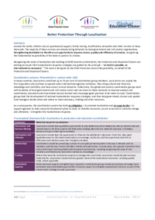This technical note presents a conceptual framework for localisation in protection and education coordination. It includes a description of the role of coordinators and coordination groups in localization and examples of how localization can be integrated in the humanitarian program cycle.
Around the world, children rely on psychosocial support, family tracing, reunification, education and other services to keep them safe. The majority of these services are already being delivered by local government and civil society organisations. Strengthening localization is therefore an opportunity to improve access, quality and efficiency of services, recognising the fundamental responsibility of the State to protect its citizens.
Recognising the value of localisation and building on WHS Summit commitments, the Protection and Education Clusters are seeking to ensure their humanitarian response strategies are guided by the principle – “as local as possible, as international as necessary.” This work is being led by the Child Protection Area of Responsibility, on behalf of the Protection and Education Clusters.

